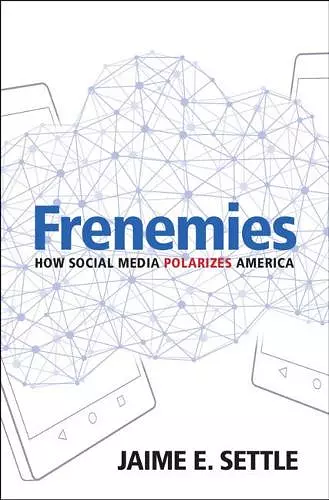Frenemies
How Social Media Polarizes America
Format:Hardback
Publisher:Cambridge University Press
Published:30th Aug '18
Currently unavailable, and unfortunately no date known when it will be back
This hardback is available in another edition too:
- Paperback£24.99(9781108459952)

Social media is polarizing America: using Facebook causes Americans to negatively judge and stereotype those people with whom they disagree about politics.
Using Facebook makes Americans psychologically polarized: negatively judging and stereotyping those people with whom they disagree about politics. The book is for graduates in political science, sociology, social psychology, and mass communication, as well as Americans who want to understand why they are repelled by politics today.Why do Americans have such animosity for people who identify with the opposing political party? Jaime E. Settle argues that in the context of increasing partisan polarization among American political elites, the way we communicate on Facebook uniquely facilitates psychological polarization among the American public. Frenemies introduces the END Framework of social media interaction. END refers to a subset of content that circulates in a social media ecosystem: a personalized, quantified blend of politically informative 'expression', 'news', and 'discussion' seamlessly interwoven into a wider variety of socially informative content. Scrolling through the News Feed triggers a cascade of processes that result in negative attitudes about those who disagree with us politically. The inherent features of Facebook, paired with the norms of how people use the site, heighten awareness of political identity, bias the inferences people make about others' political views, and foster stereotyped evaluations of the political out-group.
'Easily the most comprehensive, theory-driven examination of social media and political polarization to date.' Diana Mutz, Samuel A. Stouffer Professor of Political Science and Communication, University of Pennsylvania
'Frenemies is compelling social science with an original, provocative claim: our minds see the often non-political bits and pieces that unknown friends of friends reveal about themselves on Facebook and exaggerate them into a phalanx of misguided political opponents. Combine this mechanism with Facebook's scope, and you get a veritable polarization machine that transforms casual chitchat among strangers into bitter if illusionary partisan disagreement.' Markus Prior, Princeton University
'Frenemies is a path-breaking and well-researched book. It offers both theoretical and empirical breakthroughs on the political effects of social media. Settle's novel and insightful theoretical framework succeeds where previous scholarship has failed in providing a coherent model for understanding how unique aspects of the social media environment interact with human psychology to influence political attitudes and behavior. She also makes a compelling and strong case that Facebook, of which a majority of Americans use, has contributed to the increase in partisan bitterness and division that we observe today. This book will set the standard in the study of political communication for years to come.' Kevin Arceneaux, Temple University, Pennsylvania
'An instant classic … brilliant, [challenges] assumptions that pundits and scholars have about how the process works. The book will set the standard for future media and politics research.' Marc Hetherington, Vanderbilt University, Tennessee
'Exhaustively researched, intensely data-driven and featuring an index for ease of reference, Frenemies is a welcome contribution to public and college library Social Issues collections.' Library Bookwatch
'Frenemies represents the most comprehensive articulation and treatment of the polarizing impact of social media use available and should be essential reading for scholars who delve into this issue … [it will] appeal primarily to academic audiences.' Robert Faris, Perspectives on Politics
'… the first comprehensive and truly novel theory of political communication on social media. The book provides a whole slew of testable hypotheses that should set the agenda for research on this topic for years to come.' Kevin Munger, Public Opinion Quarterly
ISBN: 9781108472531
Dimensions: 236mm x 158mm x 23mm
Weight: 590g
330 pages